Postcolonialism
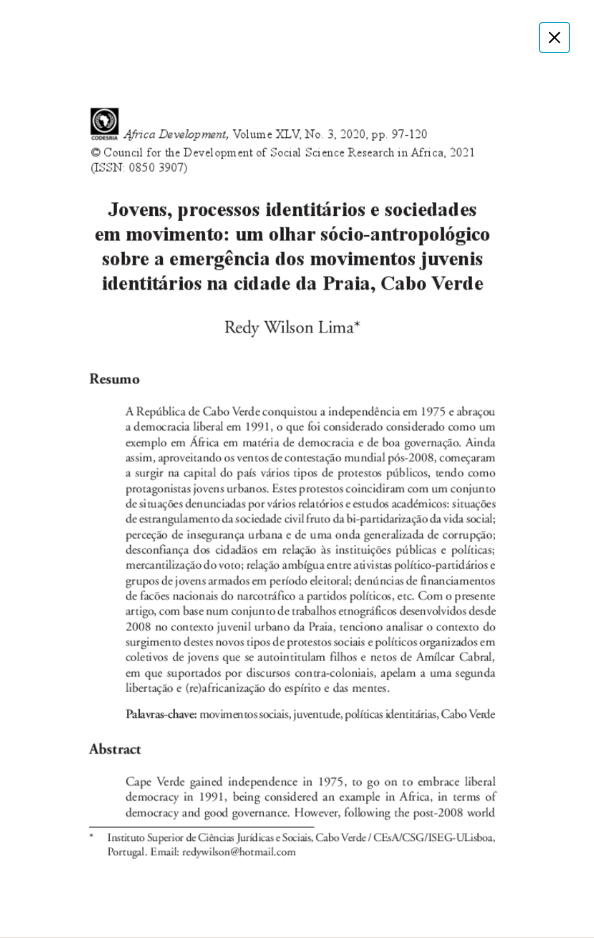
Jovens, processos identitários e sociedades em movimento
Abstract:
The Republic of Cape Verde gained independence in 1975 and embraced liberal democracy in 1991, which was regarded as an example in Africa of democracy and good governance. Still, taking advantage of the post-2008 global winds of protest, various types of public protests began to emerge in the country’s capital, with urban youth as the main protagonists. These protests coincided with a set of situations denounced by various reports and academic studies: situations of strangulation of civil society resulting from the bi-partisanship of social life; perception of urban insecurity and a generalized wave of corruption; citizens’ distrust of public and political institutions; commercialization of the vote; ambiguous relationship between political party activists and armed youth groups during elections; accusations of funding of political parties by national drug trafficking factions, etc. Jovens, processos identitários e sociedades em movimento: um olhar alternativo sobre os movimentos sociais urbanos emergentes na cidade da Praia – Cabo Verde, based on a set of ethnographic works developed since 2008 in the urban youth context of Praia, intends to analyse the context of the emergence of these new types of social and political protests organized in youth groups who call themselves sons and grandsons of Amílcar Cabral, supported by counter-colonial discourses, calling for a second liberation and (re)Africanization of the spirit and minds.
Quotation:
Lima, R.W. (2020). “Jovens, processos identitários e sociedades em movimento: um olhar alternativo sobre os movimentos sociais urbanos emergentes na cidade da Praia – Cabo Verde”. In: Jesus, L.S.B.; Barros, M.; Filice, R.C.G. (Orgs.), Tecendo redes antirracistas II: contracolonização e soberania intelectual. Fortaleza: Imprensa Universitária, p. 116-136.
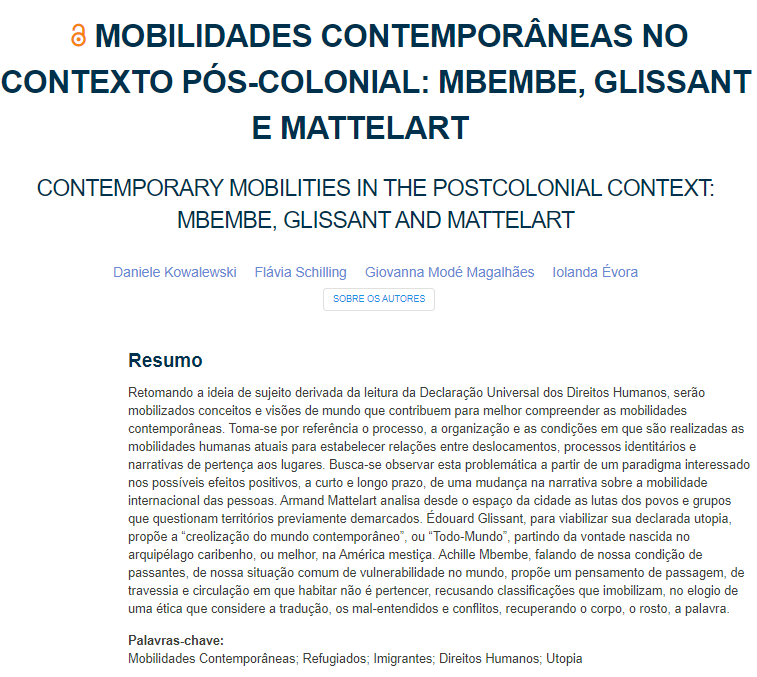
Mobilidades Contemporâneas no Contexto Pós-Colonial: Mbembe, Glissant e Mattelart
Abstract:
Taking up again the idea of subject derived from the reading of the Universal Declaration of Human Rights, concepts and worldviews will be mobilized that contribute to better understand contemporary mobilities. Reference is made to the process, the organization and the conditions in which current human mobilities are carried out to establish relationships between displacement, identity processes and narratives of belonging to places. In Mobilidades Contemporâneas no Contexto Pós-Colonial: Mbembe, Glissant e Mattelart we seek to observe this problematic from a paradigm interested in the possible positive effects, in the short and long term, of a change in the narrative on the international mobility of people. Armand Mattelart analyses, from the space of the city, the struggles of peoples and groups that question previously demarcated territories. To make his declared utopia viable, Édouard Glissant proposes the “creolisation of the contemporary world”, or the “All-World”, starting from the will born in the Caribbean archipelago, or rather, in mestizo America. Achille Mbembe, speaking of our condition of passers-by, of our common situation of vulnerability in the world, proposes a thought of passage, of crossing and circulation in which to inhabit is not to belong, refusing classifications that immobilise, in praise of an ethic that considers translation, misunderstandings and conflicts, recovering the body, the face, the word.
Quotation:
“Kowalewski, Daniele, Schilling, Flávia, Magalhães, Giovanna Modé, & Évora, Iolanda. (2019). Mobilidades Contemporâneas no Contexto Pós-Colonial: Mbembe, Glissant e Mattelart. Lua Nova: Revista de Cultura e Política, (108), 137-156. Epub November 28, 2019. https://doi.org/10.1590/0102-137156/108“
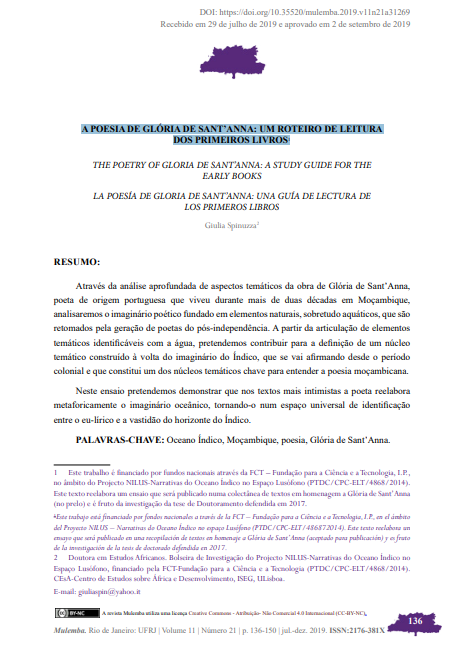
A poesia de Glória de Sant’anna: um roteiro de leitura dos primeiros livros
Abstract:
Through in-depth analysis of thematic aspects of the work of Glória de Sant’Anna, a poet of Portuguese origin who lived for over two decades in Mozambique, we will analyze in A poesia de Glória de Sant’Anna: um roteiro de leitura dos primeiros livros the poetic imaginary based on natural elements, especially aquatic, which are resumed by the generation of post-independence poets. Through the articulation of thematic elements identifiable with water, we intend to contribute to the definition of a thematic core built around the imaginary of the Indian Ocean, which has been asserting itself since the colonial period and which constitutes one of the key thematic cores for understanding Mozambican poetry. In this essay, we intend to demonstrate that in the most intimate texts, the poet metaphorically reworks the oceanic imaginary, turning it into a universal space of identification between the lyric self and the vastness of the Indian Ocean horizon. This work is financed by national funds through FCT – Fundação para a Ciência e a Tecnologia, I.P., under the NILUS-Narratives of the Indian Ocean in the Lusophone Space Project (PTDC/CPC-ELT/4868/2014). This text reworks an essay that will be published in a collection of texts in tribute to Glória de Sant’Anna (in press) and is the result of the research of the PhD thesis defended in 2017.
Quotation:
“Spinuzza, Giulia. A poesia de Glória de Sant’Anna: um roteiro de leitura dos primeiros livros. Mulemba, UFRJ, Brasil, vol. 11, n. 21, Dezembro 2019, p. 136 https://revistas.ufrj.br/index.php/mulemba/issue/view/1302/showToc”
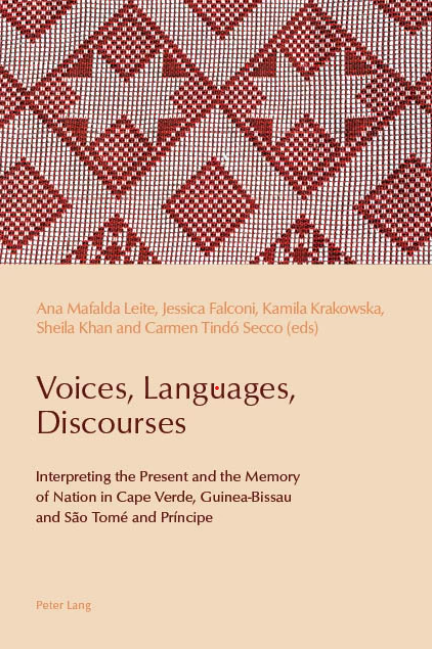
Voices, Languages, Discourses: Interpreting the present and the memory of Nation in Cape Verde, Guinea-Bissau and São Tomé and Príncipe
Abstract:
Voices, Languages, Discourses: Interpreting the Present and the Memory of Nation in Cape Verde, Guinea-Bissau and São Tomé and Príncipe brings together a selection of interviews with writers and filmmakers from Cape Verde, Guinea-Bissau and São Tomé and Príncipe in order to examine representations and images of national identity in these countries’ postcolonial narratives. It continues and completes the exploration of the postcolonial imaginary and identity of Portuguese-speaking Africa presented in the previous interview volume Speaking the Postcolonial Nation: Interviews with Writers from Angola and Mozambique (2014). Memory, history, migration and diaspora are central notions in the recreation and reconceptualisation of the nation and its identities in Cape Verdean, Guinean and São Tomense literary and film culture. By bringing together different generations of writers and filmmakers, with a wide variety of perspectives on the historical, social and cultural changes that occurred in their countries, this book makes a valuable contribution to current debates on post-colonialism, nation and identity in these former Portuguese colonies.
Quotation:
Leite, A., M., Falconi, J., Krakowska, K., Kahn, S., Secco, C. (2020). Voices, Languages, Discourses: Interpreting the Present and the Memory of Nation in Cape Verde, Guinea-Bissau and São Tomé and Príncipe. Oxford, United Kingdom: Peter Lang Verlag. Retrieved Oct 6, 2022, from https://www.peterlang.com/document/1055586
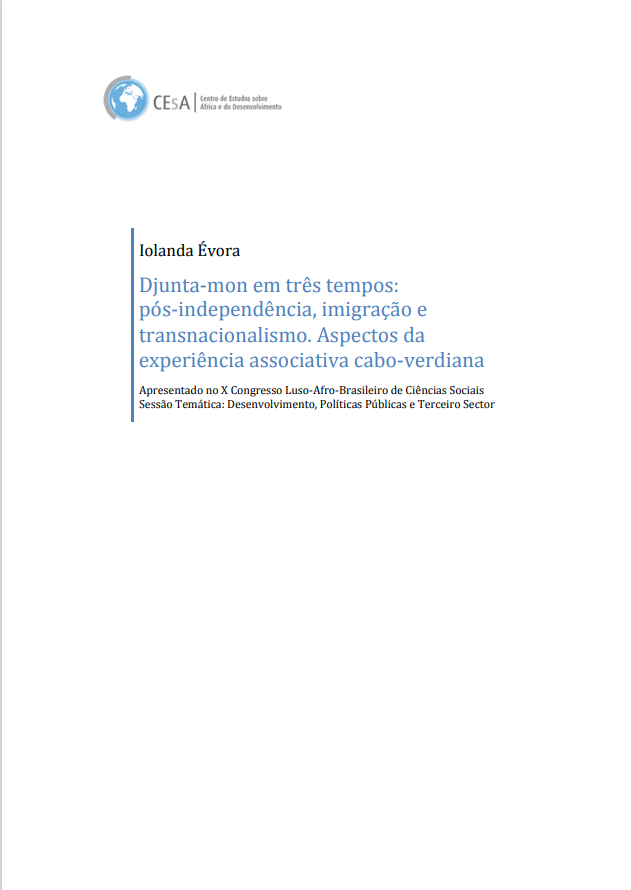
Djunta-mon em Três Tempos: Pós-independência, imigração e transnacionalismo. Aspectos da experiência associativa cabo-verdiana
Abstract:
Djunta-mon em três tempos: pós-independência, imigração e transnacionalismo. Aspectos da experiência associativa cabo-verdiana focuses on voluntary associations and discusses the material and psychosocial conditions of membership and participation of members. These aspects are analyzed from the point of view of the members of cooperatives in the rural area of the island of Santiago, created in the post-independence period, and of Cape Verdean immigrant associations in Portugal. In Santiago, we identified both singular forms of appropriation of the official ideological base and governmental objectives, as well as cultural permanences that, through practices such as djunta-mon, ensure the protection of social identities and allow familiarity and subjective control of this social practice. . In immigration, spontaneous associations propose to maintain identity, promote social inclusion or solve common problems and needs and reflect the heterogeneity, social cleavages and class divisions of origin that are reproduced in immigration. Currently, formal demands for greater rigor and technical and human competence in its functioning seem to weaken spontaneous and voluntary adhesion and the djunta-mon. At the same time, it questions the traditional role of these associations in the face of changes in immigration with the inclusion of new profiles such as transnational migrants. We examine the adaptability of this collective strategy, indicating that in the past, in the present and in the face of the possibility of a transnational associative practice, the use of the traditional djunta mon adapted to the lived context, ensures the maintenance of the strong network of reciprocity and sociability essential to survival and success. of the associations.
Quotation:
Évora, Iolanda. 2011. “Djunta-mon em três tempos: pós-independência, imigração e transnacionalismo. Aspectos da experiência associativa cabo-verdiana”. Comunicação apresentada no X Congresso Luso-Afro-Brasileiro de Ciências Sociais, Sessão Temática Desenvolvimento, Políticas Públicas e Terceiro Sector





